#LIVE AT THE LYCEUM
Text
The Sisters Of Mercy - No Time To Cry
#The Sisters Of Mercy#Halloween#Live at the Lyceum#London#31-10-1984#No Time To Cry#Format:#Cassette#Compilation#Unofficial Release#Goth Rock#gothic rock#UK
48 notes
·
View notes
Text

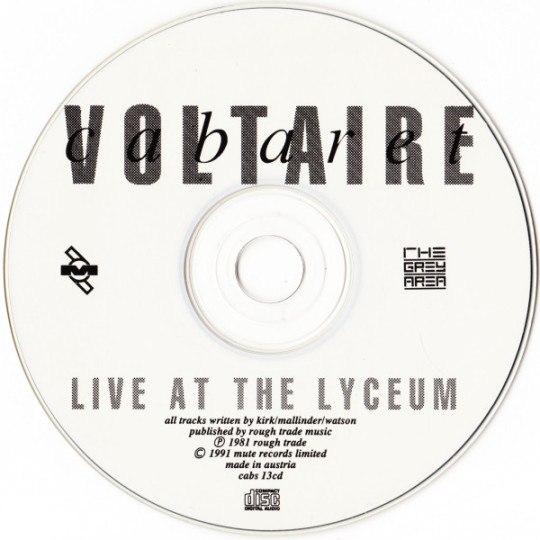

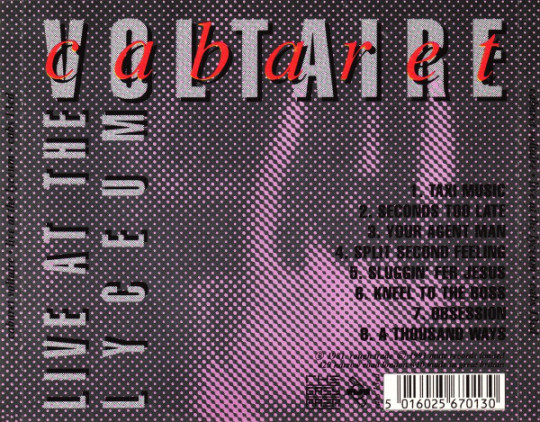
Cabaret Voltaire
Live At The Lyceum (1981)
13 notes
·
View notes
Text
CABARET VOLTAIRE // OBSESSION
[LIVE @ THE LYCEUM, rec. 1981]
#audio#cabaret voltaire#richard h kirk#industrial#electro#experimental#live#live at the lyceum#80s#electronic#music#u
28 notes
·
View notes
Note
Create another valyrian household that escaped Valyria. They hid themselves away by magic on an island not visible to anyone, they don't wish to be seen. On an island with a huge fortress accompanied with another smaller fortress which is basically a library. They are similar to Targaryens, but much more knowledgeable on everything (thanks to Valyria). They ride dragons, purple shades of eyes, silver-gold hair. Only two differences being, they have never been married outside of family(yuck) with no Westerosi blood therefore very different customs, fully valyrian customs and traditions rather than Westerosi+valyrian(Targs, Vels). Hope you have fun, thank you:)

𓈒ㅤׂㅤ 𓇼 ࣪ 𝐇𝐎𝐔𝐒𝐄 𝐋𝐘𝐑𝐈𝐄𝐋𝐋𝐄 𓈒ㅤׂㅤ⭒⠀



꒰͡ ⠀ ִ 𝐺𝐸𝑁𝑇𝐿𝐸 𝐴𝑁𝐷 𝐿𝑂𝑉𝐼𝑁𝐺 ⠀ׂ ⠀ ͡꒱
─ 𝘈 𝘤𝘳𝘦𝘢𝘵𝘶𝘳𝘦 𝘰𝘧 𝘮𝘢𝘨𝘪𝘤, 𝘨𝘳𝘢𝘤𝘦, 𝘢𝘯𝘥 𝘭𝘪𝘨𝘩𝘵 𖤐
─ 𝘈 𝘣𝘦𝘪𝘯𝘨 𝘰𝘧 𝘱𝘶𝘳𝘪𝘵𝘺, 𝘢 𝘸𝘰𝘯𝘥𝘳𝘰𝘶𝘴 𝘴𝘪𝘨𝘩𝘵 𖤐

In the rich tapestry of Valyrian history, woven with the threads of power, magic, and dragonfire, the House Lyrielle stands as a testament to the enduring grace and wisdom of Old Valyria. Their story is a whisper on the wind, a secret melody sung by the waves that surround their hidden island sanctuary. Known to but a few, the Lyrielles are the guardians of a legacy untainted by the ambition and corruption that led to the Doom.
The sigil of House Lyrielle is as enigmatic as the house itself—an angelic dragon, graceful and serene, enwreathed in a ring of white roses against a backdrop of deepest emerald. The dragon, smaller in stature but fierce in its intelligence and agility, represents the nature of the Lyrielles' own dragons. The emerald ground symbolizes their secluded island, a jewel hidden in the vast sea, and the white roses signify the purity of their intentions and the mystical barriers that veil their home from the unwary eye.
Their words, "Beyond Sight, Within Light," speak to the heart of the House Lyrielle ethos. They live beyond the sight of the known world, in a realm of their own making, where knowledge and virtue shine brighter than any Valyrian steel. These words are a promise of their commitment to the greater good, a reminder of their hidden presence guiding the fate of the world from the shadows.
The Lyrielles, in their seclusion, have preserved the purity of their Valyrian bloodline, untouched by Westerosi influence. Their customs and traditions remain a living tapestry of Old Valyria's glory, a culture preserved in amber amidst the tumultuous seas of change.
Education and learning are held in the highest regard. The smaller fortress, known as the Lyceum of Light, houses a vast collection of scrolls and tomes, not only on magic and dragonlore but on the sciences, arts, and philosophies of the wider world. Even though the Lyrielles seclude themselves from the outside, they possess an insatiable thirst for knowledge that keeps their minds as sharp as their swords.
The Lyrielles are ethereal in their beauty, with eyes that hold the mysteries of the universe—shades of purple that shift with the light. Their silver-gold hair flows like liquid moonlight, a hallmark of their Valyrian bloodline. They are skilled in the art of healing, their touch capable of mending wounds that would confound even the most learned maesters. Their bond with their dragons is profound, rooted in a deep understanding and respect for these majestic creatures.
Their dragons, lithe and swift, mirror their masters in both appearance and temperament. With scales that catch the moon's light, casting reflections in hues of amethyst and sapphire, they are specters of the night sky, their presence felt rather than seen, their agility unmatched by any creature, mythical or otherwise.
To the Lyrielles, the world outside is a place of beauty marred by the scars of greed and violence. They see themselves as custodians of what remains pure and true. Their philosophy is one of balance and harmony, seeking to preserve the natural world and its wonders. They are benevolent, yet their kindness is not a weakness but a strength, fortified by their unwavering sense of justice and fairness.
The Lyrielles embody a paradox. They are both guardians and isolationists, wielding their power to protect the natural world and its untold secrets while shunning the very societies they seek to preserve from afar. Their personalities are marked by a gentle demeanor, an innate grace that belies the strength and wisdom that centuries of unbroken tradition have instilled in them. They are the custodians of healing, their knowledge of the arcane arts allowing them to mend wounds and cure maladies thought beyond the reach of mortal hands.
Yet, for all their power and knowledge, the Lyrielles possess a naivety born of their seclusion. They view the outside world through the lens of caution and fear, tales of its dangers passed down through generations. This isolation has fostered a deep sense of kinship and loyalty among them, their bonds unbreakable, their trust in one another absolute.
In a realm where the quest for power often leads to ruin, House Lyrielle remains a beacon of hope. They are the whisper in the heart of the storm, the unseen hand that guides towards light. Their existence is a testament to the belief that even in the darkest of times, there are those who shine brightly, not for glory or fame, but for the love of all that is good and true in the world.

My other original house:
House Celestyr
House Valysar
@fragileheartbeats . Don't plagiarise, repost, or translate any of my works on here or any other websites.
@emily2003alzaga @nash-dara @altaircc @heavenly1927 @omgsuperstarg @asoiafhyperfixation
#house lyrielle#house of the dragon#house targaryen#house of dragons#house of dragon oc#house of the dragon x reader#hotd fanfic#hotd oc#hotd x reader#a song of ice and fire#song of ice and fire#game of thrones x reader#game of thrones oc#game of thrones#aemond fanfiction#aemond one eye#aemond targaryen#aemond x reader#daemon targeryan#daemon targaryen x reader#writing#fantasy#novel#story#daemon x reader#aegon ii targaryen x reader#aegon x reader#aegon ii targaryen#aegon ii x reader#asoiaf
391 notes
·
View notes
Text

FATHER & SON: James Earl Jones with his Father Robert Earl Jones on Stage in the 1962 Production "Moon on a Rainbow Shawl."
Robert Earl Jones (February 3, 1910 – September 7, 2006), sometimes credited as Earl Jones, was an American actor and professional boxer. One of the first prominent Black film stars, Jones was a living link with the Harlem Renaissance of the 1920s and 1930s, having worked with Langston Hughes early in his career.
Jones was best known for his leading roles in films such as Lying Lips (1939) and later in his career for supporting roles in films such as The Sting (1973), Trading Places (1983), The Cotton Club (1984), and Witness (1985).
Jones was born in northwestern Mississippi; the specific location is unclear as some sources indicate Senatobia, while others suggest nearby Coldwater. He left school at an early age to work as a sharecropper to help his family. He later became a prizefighter. Under the name "Battling Bill Stovall", he was a sparring partner of Joe Louis.
Jones became interested in theater after he moved to Chicago, as one of the thousands leaving the South in the Great Migration. He moved on to New York by the 1930s. He worked with young people in the Works Progress Administration, the largest New Deal agency, through which he met Langston Hughes, a young poet and playwright. Hughes cast him in his 1938 play, Don't You Want to Be Free?.
Jones also entered the film business, appearing in more than twenty films. His film career started with the leading role of a detective in the 1939 race film Lying Lips, written and directed by Oscar Micheaux, and Jones made his next screen appearance in Micheaux's The Notorious Elinor Lee (1940). Jones acted mostly in crime movies and dramas after that, with such highlights as Wild River (1960) and One Potato, Two Potato (1964). In the Oscar-winning 1973 film The Sting, he played Luther Coleman, an aging grifter whose con is requited with murder leading to the eponymous "sting". In the later 20th century, Jones appeared in several other noted films: Trading Places (1983) and Witness (1985).
Toward the end of his life, Jones was noted for his stage portrayal of Creon in The Gospel at Colonus (1988), a black musical version of the Oedipus legend. He also appeared in episodes of the long-running TV shows Lou Grant and Kojak. One of his last stage roles was in a 1991 Broadway production of Mule Bone by Hughes and Zora Neale Hurston, another important writer of the Harlem Renaissance. His last film was Rain Without Thunder (1993).
Although blacklisted by the House Un-American Activities Committee in the 1950s due to involvement with leftist groups, Jones was ultimately honored with a lifetime achievement award by the U.S. National Black Theatre Festival.
Jones was married three times. As a young man, he married Ruth Connolly (died 1986) in 1929; they had a son, James Earl Jones. Jones and Connolly separated before James was born in 1931, and the couple divorced in 1933. Jones did not come to know his son until the mid-1950s. He adopted a second son, Matthew Earl Jones. Jones died on September 7, 2006, in Englewood, New Jersey, from natural causes at age 96.
THEATRE
1945 The Hasty Heart (Blossom) Hudson Theatre, Broadway
1945 Strange Fruit (Henry) McIntosh NY theater production
1948 Volpone (Commendatori) City Center
1948 Set My People Free (Ned Bennett) Hudson Theatre, Broadway
1949 Caesar and Cleopatra (Nubian Slave) National Theatre, Broadway
1952 Fancy Meeting You Again (Second Nubian) Royale Theatre, Broadway
1956 Mister Johnson (Moma) Martin Beck Theater, Broadway
1962 Infidel Caesar (Soldier) Music Box Theater, Broadway
1962 The Moon Besieged (Shields Green) Lyceum Theatre, Broadway
1962 Moon on a Rainbow Shawl (Charlie Adams) East 11th Street Theatre, New York
1968 More Stately Mansions (Cato) Broadhurst Theatre, Broadway
1975 All God's Chillun Got Wings (Street Person) Circle in the Square Theatre, Broadway
1975 Death of a Salesman (Charley)
1977 Unexpected Guests (Man) Little Theatre, Broadway
1988 The Gospel at Colonus (Creon) Lunt-Fontanne Theatre, Broadway
1991 Mule Bone (Willie Lewis) Ethel Barrymore Theatre, Broadway
FILMS
1939 Lying Lips (Detective Wenzer )
1940 The Notorious Elinor Lee (Benny Blue)
1959 Odds Against Tomorrow (Club Employee uncredited)
1960 Wild River (Sam Johnson uncredited)
1960 The Secret of the Purple Reef (Tobias)
1964 Terror in the City (Farmer)
1964 One Potato, Two Potato (William Richards)
1968 Hang 'Em High
1971 Mississippi Summer (Performer)
1973 The Sting (Luther Coleman)
1974 Cockfighter (Buford)
1977 Proof of the Man (Wilshire Hayward )
1982 Cold River (The Trapper)
1983 Trading Places (Attendant)
1983 Sleepaway Camp (Ben)
1984 The Cotton Club (Stage Door Joe)
1984 Billions for Boris (Grandaddy)
1985 Witness (Custodian)
1988 Starlight: A Musical Movie (Joe)
1990 Maniac Cop 2 (Harry)
1993 Rain Without Thunder (Old Lawyer)
TELEVISION
1964 The Defenders (Joe Dean) Episode: The Brother Killers
1976 Kojak (Judge) Episode: Where to Go if you Have Nowhere to Go?
1977 The Displaced Person (Astor) Television movie
1978 Lou Grant (Earl Humphrey) Episode: Renewal
1979 Jennifer's Journey (Reuven )Television movie
1980 Oye Ollie (Performer) Television series
1981 The Sophisticated Gents (Big Ralph Joplin) 3 episodes
1982 One Life to Live
1985 Great Performances (Creon) Episode: The Gospel at Colonus
1990 True Blue (Performer) Episode: Blue Monday
#james earl jones#black tumblr#black literature#black community#black excellence#blackexcellence365#actor#robert earl jones#stage actor
225 notes
·
View notes
Text
Pass it on
This just in:
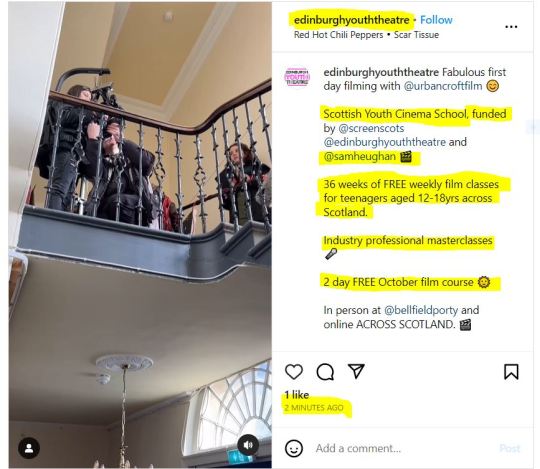
Meet the new Scottish Youth Cinema School. Funded by Screen Scotland, EDI's Youth Theatre and S. Tailored for 12-18 years' old, just to give them a first opportunity to get acquainted & immersed in the fascinating world of cinema. With a consistent offer to boot: 9 months of weekly film classes and industry professional masterclasses. All FREE.
The partnership is very prestigious: Screen Scotland is part of Creative Scotland, the Scottish Government's body competent for supporting 'the arts, screen and creative industries across all parts of Scotland on behalf of everyone who lives, works or visits'. As such, funding is either via the Scottish public budget, or (as is customary in the UK - I successfully proposed a similar scheme in my country, a long time ago) by using part of the National Lottery's profits.
Passing it on and giving back to the community. Quietly and unassumingly - by now, we're used to his MO.
The boy who used to be an usher at Edinburgh's Lyceum Theatre. That good man bitches love to bitch about.
Well done, Sir! I see great things.
245 notes
·
View notes
Text

The B-52's in their live debut playing in London's Lyceum Ballroom, UK as support for The Tourists, July 8, 1979
193 notes
·
View notes
Text
I want to live in an Art Gallery / Bookstore / Weird cozy cafe / Museum / Observatory / Lyceum / Tower . . . Place . .
73 notes
·
View notes
Text
Lucius Spriggs is a nobleman HC
my personal hc which i love with all my heart and soul and which seems so real to me is that he is from a noble family. my judgments are based on the behavior of the character in certain situations, and i hope that there are those who also think so.
first of all, let's remember that Lucius knows how to write, can read, and draw beautifully (whatever his drawings are). as far as I know, not everyone could get an education at the beginning of the 18th century (when the series takes place). the ordinary working class had no access to education, and the ordinary family never had books, and no one exchanged letters. even clerical work was available only to those who had money or connections (most often family). for example, in the Russian empire (I am from Ukraine and studied its history), only the children of wealthy citizens or nobles could become clerical officials and any other workers that were in any way connected with writing and papers. to get such an education, one had to either hire personal teachers or attend boarding schools (lyceums), where education costs a lot of money.
the working class never had access to education and even those who lived in the cities rarely knew how to read. such luxury was available only to wealthy merchants, family business owners or doctors, who also did not come from ordinary families. education needs money. much money. and so it has always been.
even if we assume that Lucius learned to write, read, and draw on his own, it still seems unlikely. how? tell me how many of you learned this on your own. to start reading, you must at least learn how letters are read. if his parents are ordinary workers, then they most likely could not even write their own name (they would not need to). and Lucius was able and very legible.
second, his behavior. Lucius is squeamish about blood, does not like to work, and most likely simply does not even know how to do any difficult work. looking at him, I see a man who has never worked and never did anything himself. even household chores seem to him incomprehensible labor. it seems that he will not survive on the street for a week if suddenly he does not have a penny in his pocket. it’s just that a boy from a working-class district cannot be such a kid glove, because in those days children were attracted to real work from the age of 10 (sometimes even earlier). if so, then a Lucius who is at least 17 should be able to do a lot of menial work, and not shirk even the simplest task.
i would also like to remember that Lucius is not inclined to communicate only in obscenities and simple sentences. he can speak in hints, express his thoughts, and formulate sentences. he understands people well, and even with his free attitude to love and sex, he fucks anyone just for the sake of sex. this and much more speaks volumes about his level of education.
also, let's remember how back in the first episodes he was able to tell where to go based on his knowledge of the weather. believe me, a cat man has never been to school and has not been to the sea, he will not know this. to understand such things one needs knowledge in geography, biology, and astronomy. such knowledge is given only in lyceums or colleges.
Lucius, I think, left the house after learning that he was engaged to some noble lady or that his wedding was already planned. such marriages without the consent of the newlyweds themselves were not uncommon in those days among noble families who thought only about purity of blood, status, and wealth. for him, his own freedom is clearly higher than material wealth, therefore this is a completely expected step for him.
call me weird or challenge my headcanon but I can't shake the idea that Lucius Spriggs is a runaway aristocrat from an unwanted marriage.
63 notes
·
View notes
Text
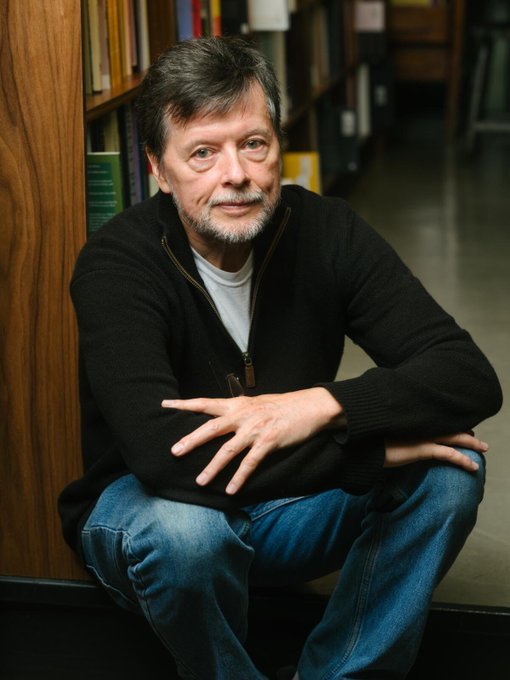
KEN BURNS' COMMENCEMENT SPEECH AT BRANDEIS
TCINLA
MAY 29, 2024
Something worthwhile to read and consider at this fraught time.
I am deeply honored and privileged that you have asked me here to say a few words at such a momentous occasion that you might find what I have to say worthy of your attention on so important a day in all of your lives. Thank you for this honor.
Listen, I am in the business of history. It is not always a happy subject on college campuses these days, particularly when forces seem determined to eliminate or water down difficult parts of our past, particularly when the subject may seem to sum an anachronistic and irrelevant pursuit, and particularly with the ferocious urgency this moment seems to exert on us. It is my job, however, to remind people of the power our past also exerts, to help us better understand what's going on now with compelling story, memory, and anecdote. It is my job to try to discern patterns and themes from history to enable us to interpret our dizzying and sometimes dismaying present.
For nearly 50 years now, I have diligently practiced and rigorously tried to maintain a conscious neutrality in my work, avoiding advocacy if I could, trying to speak to all of my fellow citizens. Over those many decades I've come to understand a significant fact, that we are not condemned to repeat, as the saying goes, what we don't remember. That is a beautiful, even poetic phrase, but not true. Nor are there cycles of history as the academic community periodically promotes. The Old Testament, Ecclesiastes to be specific, got it right, I think. What has been will be again, what has been done will be done again. There is nothing new under the sun. What those lines suggest is that human nature never changes or almost never changes. We continually superimpose that complex and contradictory human nature over the seemingly random chaos of events, all of our inherent strengths and weaknesses, our greed and generosity, our puritanism and our prurience, our virtue, and our venality parade before our eyes, generation after generation after generation. This often gives us the impression that history repeats itself. It does not. "No event has ever happened twice, it just rhymes," Mark Twain is supposed to have said. I have spent all of my professional life on the lookout for those rhymes, drawn inexorably to that power of history. I am interested in listening to the many varied voices of a true, honest, complicated past that is unafraid of controversy and tragedy, but equally drawn to those stories and moments that suggest an abiding faith in the human spirit, and particularly the unique role this remarkable and sometimes also dysfunctional republic seems to play in the positive progress of mankind.
During the course of my work, I have become acquainted with hundreds if not thousands of those voices. They have inspired, haunted, and followed me over the years. Some of them may be helpful to you as you try to imagine and make sense of the trajectory of your lives today.
Listen, listen. In January of 1838, shortly before his 29th birthday, a tall, thin lawyer prone to bouts of debilitating depression addressed the young men's lyceum in Springfield, Illinois. "At what point shall we expect the approach of danger?" He asked his audience, "Shall we expect some trans-Atlantic military giant to step the earth and crush us at a blow?" Then he answered his own question. "Never. All the armies of Europe, Asia, and Africa could not by force take a drink from the Ohio River or make a track on the Blue Ridge in a trial of a thousand years. If destruction be our lot, we must ourselves be its author and finisher. As a nation of free men, we must live through all time or die by suicide." It is a stunning, remarkable statement, one that has animated my own understanding of the American experience since I first read it more than 40 years ago. That young man was of course Abraham Lincoln, and he would go on to preside over the closest this country has ever come to near national suicide, our civil war, and yet embedded in his extraordinary, disturbing, and prescient words is also a fundamental optimism that implicitly acknowledges the geographical forcefield two mighty oceans east and west and two relatively benign neighbors north and south have provided for us since the British burned the White House in the War of 1812 and inspired Francis Scott Key.
Lincoln's words that day suggest what is so great and so good about the people who happen to inhabit this lucky and exquisite country of ours. That's the world you now inherit: our work ethic and our restlessness, our innovation and our improvisation, our communities and our institutions of higher learning, our suspicion of power. The fact that we seem resolutely dedicated to parsing the meaning between individual and collective freedom; What I want versus what we need. That we are all so dedicated to understanding what Thomas Jefferson really meant when he wrote that mysterious phrase, "The pursuit of happiness". Hint, it happens right here in the lifelong learning and perpetual improvement this university is committed to.
But the isolation of those two oceans has also helped to incubate habits and patterns less beneficial to us: our devotion to money and guns and conspiracies, our certainty about everything, our stubborn insistence on our own exceptionalism blinding us to that which needs repair, especially with regard to race and ethnicity. Our preoccupation with always making the other wrong at an individual as well as a global level. I am reminded of what the journalist I.F. Stone once said to a young acolyte who was profoundly disappointed in his mentor's admiration for Thomas Jefferson. "It's because history is tragedy," Stone admonished him, "Not melodrama." It's the perfect response. In melodrama all villains are perfectly villainous and all heroes are perfectly virtuous, but life is not like that. You know that in your guts and nor is our history like that. The novelist, Richard Powers recently wrote that, "The best arguments in the world," — and ladies and gentlemen, that's all we do is argue — "the best arguments in the world," he said, "Won't change a single person's point of view. The only thing that can do that is a good story." I've been struggling for most of my life to do that, to try to tell good, complex, sometimes contradictory stories, appreciating nuance and subtlety and undertow, sharing the confusion and consternation of unreconciled opposites.
But it's clear as individuals and as a nation we are dialectically preoccupied. Everything is either right or wrong, red state or blue state, young or old, gay or straight, rich or poor, Palestinian or Israeli, my way or the highway. Everywhere we are trapped by these old, tired, binary reactions, assumptions, and certainties. For filmmakers and faculty, students and citizens, that preoccupation is imprisoning. Still, we know and we hear and we express only arguments, and by so doing, we forget the inconvenient complexities of history and of human nature. That, for example, three great religions, their believers, all children of Abraham, each professing at the heart of their teaching, a respect for all human life, each with a central connection to and legitimate claim to the same holy ground, violate their own dictates of conduct and make this perpetually contested land a shameful graveyard. God does not distinguish between the dead. "Could you?"
[Audience applauding]
"Could you?" A very wise person I know with years of experience with the Middle East recently challenged me, "Could you hold the idea that there could be two wrongs and two rights?"
Listen, listen. In a filmed interview I conducted with the writer James Baldwin, more than 40 years ago, he said, "No one was ever born who agreed to be a slave, who accepted it. That is, slavery is a condition imposed from without. Of course, the moment I say that," Baldwin continued, "I realize that multitudes and multitudes of people for various reasons of their own enslave themselves every hour of every day to this or that doctrine, this or that delusion of safety, this or that lie. Anti-Semites, for example," he went on, "are slaves to a delusion. People who hate Negroes are slaves. People who love money are slaves. We are living in a universe really of willing slaves, which makes the concept of liberty and the concept of freedom so dangerous," he finished. Baldwin is making a profoundly psychological and even spiritual statement, not just a political or racial or social one. He knew, just as Lincoln knew, that the enemy is often us. We continue to shackle ourselves with chains we mistakenly think is freedom.
Another voice, Mercy Otis Warren, a philosopher and historian during our revolution put it this way, "The study of the human character at once opens a beautiful and a deformed picture of the soul. We there find a noble principle implanted in the nature of people, but when the checks of conscience are thrown aside, humanity is obscured." I have had the privilege for nearly half a century of making films about the US, but I have also made films about us. That is to say the two letter, lowercase, plural pronoun. All of the intimacy of "us" and also "we" and "our" and all of the majesty, complexity, contradiction, and even controversy of the US. And if I have learned anything over those years, it's that there's only us. There is no them. And whenever someone suggests to you, whomever it may be in your life that there's a them, run away. Othering is the simplistic binary way to make and identify enemies, but it is also the surest way to your own self imprisonment, which brings me to a moment I've dreaded and forces me to suspend my longstanding attempt at neutrality.
There is no real choice this November. There is only the perpetuation, however flawed and feeble you might perceive it, of our fragile 249-year-old experiment or the entropy that will engulf and destroy us if we take the other route. When, as Mercy Otis Warren would say, "The checks of conscience are thrown aside and a deformed picture of the soul is revealed." The presumptive Republican nominee is the opioid of all opioids, an easy cure for what some believe is the solution to our myriad pains and problems. When in fact with him, you end up re-enslaved with an even bigger problem, a worse affliction and addiction, "a bigger delusion", James Baldwin would say, the author and finisher of our national existence, our national suicide as Mr. Lincoln prophesies. Do not be seduced by easy equalization. There is nothing equal about this equation. We are at an existential crossroads in our political and civic lives. This is a choice that could not be clearer.
[Audience applauding]
Listen, listen. 33 years ago, the world lost a towering literary figure. The novelist and storyteller, not arguer, Isaac Bashevis Singer. For decades he wrote about God and myth and punishment, fate and sexuality, family and history. He wrote in Yiddish a marvelously expressive language, sad and happy all at the same time. Sometimes maddeningly all knowing, yet resigned to God's seemingly capricious will. It is also a language without a country, a dying language in a world more interested in the extermination or isolation of its long suffering speakers. Singer, writing in the pages of the Jewish Daily Forward help to keep Yiddish alive. Now our own wonderfully mongrel American language is punctuated with dozens of Yiddish words and phrases, parables and wise sayings, and so many of those words are perfect onomatopoeias of disgust and despair, hubris and humor. If you've ever met a schmuck, you know what I'm talking about. [audience laughs] Toward the end of his long and prolific life, Singer expressed wonder at why so many of his books written in this obscure and some said useless language would be so widely translated, something like 56 countries all around the world. "Why," he would wonder with his characteristic playfulness, "Why would the Japanese care about his simple stories of life in the shtetls of Eastern Europe 1,000 years ago?" "Unless," Singer paused, twinkle in his eye, "Unless the story spoke of the kinship of the soul." I think what Singer was talking about was that indefinable something that connects all of us together, that which we all share as part of organic life on this planet, the kinship of the soul. I love that.
Okay, let me speak directly to the graduating class. Watch out, here comes the advice. Listen. Be curious, not cool. Insecurity makes liars of us all. Remember, none of us get out of here alive. The inevitable vicissitudes of life, no matter how well gated our communities, will visit us all. Grief is a part of life, and if you explore its painful precincts, it will make you stronger. Do good things, help others. Leadership is humility and generosity squared. Remember the opposite of faith is not doubt. Doubt is central to faith. The opposite of faith is certainty. The kinship of the soul begins with your own at times withering self-examination. Try to change that unchangeable human nature of Ecclesiastes, but start with you. "Nothing so needs reforming," Mark Twain once chided us, "As other people's habits." [audience laughs]
Don't confuse success with excellence. Do not descend too deeply into specialism. Educate all of your parts, you will be healthier. Do not get stuck in one place. "Travel is fatal to prejudice," Twain also said. Be in nature, which is always perfect and where nothing is binary. Its sheer majesty may remind you of your own atomic insignificance, as one observer put it, but in the inscrutable and paradoxical ways of wild places, you will feel larger, inspirited, just as the egotist in our midst is diminished by his or her self regard.
At some point, make babies, one of the greatest things that will happen to you, I mean it, one of the greatest things that will happen to you is that you will have to worry, I mean really worry, about someone other than yourself. It is liberating and exhilarating, I promise. Ask your parents.
[Audience laughs]
Choose honor over hypocrisy, virtue over vulgarity, discipline over dissipation, character over cleverness, sacrifice over self-indulgence. Do not lose your enthusiasm, in its Greek etymology the word enthusiasm means simply, "god in us". Serve your country. Insist that we fight the right wars. Denounce oppression everywhere.
[Audience applauding]
Convince your government, as Lincoln understood that the real threat always and still comes from within this favored land. Insist that we support science and the arts, especially the arts.
[Audience cheering]
They have nothing to do with the actual defense of our country; They just make our country worth defending.
[Audience applauding]
Remember what Louis Brandeis said, "The most important political office is that of the private citizen." Vote. You indelibly... [audience applauding] Please, vote. You indelibly underscore your citizenship, and most important, our kinship with each other when you do. Good luck and godspeed.
[Audience applauding]
11 notes
·
View notes
Text
The Sisters Of Mercy - Body And Soul
#The Sisters Of Mercy#Halloween#Live at the Lyceum#London#31-10-1984#Body And Soul#Format:#Cassette#Compilation#Unofficial Release#Goth Rock#gothic rock#UK
12 notes
·
View notes
Text
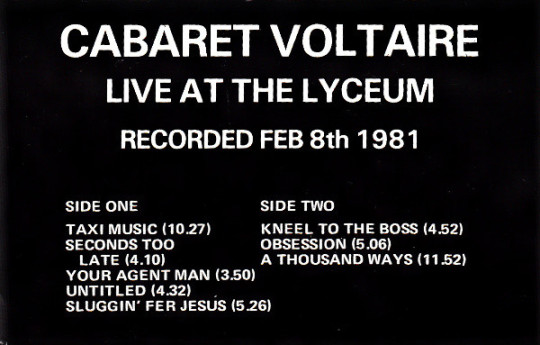



Cabaret Voltaire
Live At The Lyceum (1981)
6 notes
·
View notes
Text
The Sign of Four: In Quest of a Solution
You could find the back issues of most papers just by visiting a local library. Today, the British Newspaper Archive will, for a monthly subscription, allow you to look at a whole slew of vintage papers, including The Illustrated Police News for all your Victorian "true crime" reportage.
As mentioned before, a four-wheeler was a four-wheeled carriage with a driving seat on the top front and a luggage rack on the top; they costed more than the hansoms.
Doyle isn't very good with coming up with convincing Indian names, is he? Singh is the name used by a baptised male Sikh (Kaur is the female equivalent) i.e. a turban-wearing, dagger carrying one. Mahomet is a version of Mohammed.
The gas lights of London weren't hugely bright compared with modern street lights; you'd be able to find your way, but there's probably a decent chance you'd step in horse exhaust if you weren't careful.
The Lyceum Theatre, located on Wellington Street, dates back to 1765, but the current building is from 1834, rebuilt after a fire. It contains a balcony over the dress circle, a unique theatre.
GhostApple on Tumblr pointed out that Bram Stoker was the manager at that theatre at the time SIGN was released. The theatre at the time was run by Henry Irving and Ellen Terry, two of the biggest stars of their days, becoming Sir Henry and Dame Ellen later in life. Stoker based Dracula on Irving, but sadly Irving never actually played the Count on stage.
After a further rebuild, time as a ballroom, a demoliton threat and two closures, the Lyceum reopened in 1996 and is a Grade II* listed building, the second highest grade. Since 1999, it is the London home of The Lion King.
The normal garb of a coachman would be a top hat and a heavy double-breasted overcoat; they would be driving their vehicle in a vast array of weather conditions, sometimes on the same day as anyone who has lived in Britain can tell you.
The coach is going rather fast at this point, possibly dangerously so. The Offences against the Person Act 1861 created an offence of "causing bodily harm by wanton or furious driving"; which could mean that if a horse-drawn vehicle hit another vehicle or a person, the driver could get up to two years in prison. The offence remains on the books, being used against horse-drawn carriage drivers (still a thing, particularly in the Traveller community), motorists when not on a road or public land and cyclists, as the Road Traffic Act 1988 is not available in these cases - it is a Crown Court-only offence. In 2017, a cyclist riding at speed in East London with no front brakes hit and killed a woman; the jury found him not guilty of manslaughter, but convicted him of this offence, with the result he got a 18-month sentence.
Tiger attacks were very common in British India; tigers are known to attack humans when feeling threatened (human encroachment on their territory is a big problem)), injuries prevent them from going after other prey or they mistake a human for something else, or if one is riding a bike, their chase instinct may kick in. 33,247 people were killed by tigers between 1876 and 1912. In 2022, the Indian government recorded 112 tiger-caused deaths, up from 59 in 2021. Some tigers have ended up killing over 100 people before being shot dead.
For those having a go at Watson for shooting at a tiger cub, we don't know how old or how big the tiger cub was. A newborn tiger maybe less than 10 pounds and look adorable, but a ten month male could easily be over 100 pounds and looks rather like a full-grown adult. Especially in the dark.
This said, humans are a good deal worse than tigers. The British cleared vast amounts of their habitat for the timber to build their railways. Hunting tigers for "sport" had been a common practice for the Indian nobility and the British ruling classes liked doing it just as much, bringing modern firearms along. Remember Dr. Sterndale from DEVI? There's a chance Watson might have gone hunting himself, sadly.
The tiger hunting got worse post-independence as improved air travel made it easier for game hunters to get to India. The Indian government banned tiger hunting in 1972 and the Bengal tiger population is slowly recovering. The size of reserves have not kept up with the population and so some tigers have gone into human areas for food, usually livestock but sometimes humans. If a tiger starts killing people and attempts to tranquilise it fail, then lethal force will be authorised. In 2022, T-104, a three-year-old dubbed the "man-eater of Champaran", killed nine people before he was shot dead by the police, who conducted their search riding elephants.
The "Surrey side" refers to the southern bank of the river, the other being the "Middlesex side" referring to the now defunct county. Those terms remain in use for the Boat Races; with the Middlesex side being on the right as the crews row upstream. The two "stations" have various advantages and disadvantages; Middlesex helps at the start end, Surrey in the middle.
Vauxhall Bridge was in rather a bad shape by this point and would be replaced in 1906, five years late due to various construction and design issues. The modern bridge is notable for having the very distinctive headquarters of the Secret Intelligence Service next to its southern end.
"Hindoo" was a contemporary spelling of Hindu, today considered derogatory.
"Sahib" is the Indian equivalent of "sir" or "master"; "Mem-Sahib" is the female version. The Indians used it when speaking to white people (or about them, possibly sarcastically) and the British officers would use it with their Indian counterparts. It is less common now, but still widely used in the Indian Army and about people in positions of power.
"Khitmutgar" was a term for a male butler or underservant who would set the table for dinner etc.; during the Bengal Presidency, these would typically as opposed to Hindus.
15 notes
·
View notes
Text
My journey is all mapped out: a two-week Dracula tour of Europe

A fun fact about me is that I enjoy planning holidays that I have no intention of taking. So, if I had two free weeks and more money than I actually do, here's the Dracula-inspired journey around Europe that I might consider.
(Spoilers under the cut)
Days 1-3: Whitby

This is the opportunity to visit all the key Dracula locations, from a coastal walk to Robin Hood's Bay to gazing out over the village and the sea from Mina and Lucy's favourite spot in the graveyard of St Mary's.
In non-Dracula things, Whitby Goth Weekend happens twice a year in April and October. I recommend the Magpie Café for fish and chips.
Day 4: travel to London

Most of the long train journeys in this plan are delightful overnight sleeper services that will make you feel like you're right there with Jonathan and Mina rattling across Europe. Unfortunately, the journey from Whitby to London is not one of them.
Services are infrequent and the journey takes a solid 5 hours. But the start, where you go very very slowly through the beautiful North York Moors, isn't too bad.
Days 5-7: London

There's a whole heap of things to see in London on a theme by either Dracula or Bram Stoker:
The Lyceum Theatre, where Bram Stoker worked for 27 years
The various houses that Bram Stoker lived in
Golders Green Crematorium, where Bram Stoker's ashes can be visited by appointment
Assorted Dracula settings, such as those the Harkers visited on their London day trip
I'd also suggest a visit to Highgate Cemetery, which may have been part of the inspiration for Lucy's tomb (pop in on Karl Marx and Douglas Adams while you're there), and the British Library for general literary joy.
Exeter is a 2.5 hour train journey from London, so you could also go there, either overnight or for a speedy day-trip, if you're a completist. But personally I'd skip it and spend the time going to see the Lion King at the Lyceum or a Shakespeare play at the Globe instead.
Day 8: Paris

The characters in Dracula take a number of different routes to get across Europe, but I've gone with the route that the Crew of Light take as they go to hunt Dracula down in his home.
That means following the Man in Seat 61 guide for travelling from London to Romania by train, taking an early Eurostar to get yourself to Paris. You'll only have a few hours in Paris before the evening sleeper train, but it should be enough to visit Père Lachaise Cemetery, where Oscar Wilde is buried.
Day 9: Vienna

You'll arrive in Vienna around 10am, then have the day to spend there until another evening train. Personally, I'd spend the time visiting the Hofburg Palace and Sisi Museum; Empress Elisabeth (Sisi) of Austria was famous in the late 19th century and her tragic life story feels fitting for a Dracula tour.
Yes, this plan involves fast trains crossing multiple European countries without much of a breather. Just like they do in Dracula :)
Day 10: Cluj-Napoca

Note: I've visited all the other destinations in this guide, but never been to Romania, though I'd really like to go to Cluj in particular. So from this point on, this is based on googling, not first-hand knowledge.
Cluj, referred to by the German name of Klausenburg in Dracula, is the unofficial capital of Transylvania. Your sleeper train from Vienna should get there around 8.20am, in time to hop on a tram to the Old Town's cluster of breakfast places. I've been told that Cluj is a lively, student-y city with great nightlife and festivals.
Days 11-14: Romania

Time to explore Romania! At this point there's a decision to make. On the one hand, there's strict adherence to the settings of Dracula, in which case you'll want to head to Bistrița, or maybe even extend your journey on to Varna or Galați.
On the other hand, you could go more on vibes. In which case, hire a car to drive through the remoter parts of Transylvania, then turn south to Bran Castle, which has very little actual connection to Dracula but certainly looks the part.
-------
In the unlikely event that anyone actually does this journey off the back of this post, please let me know how it goes. I'd be so thrilled to hear about it!
44 notes
·
View notes
Text
The historical Spiritualism vs Modern New Ageism
The word “Spiritualist” is thrown around quite frequently on the Internet as a catch-all term for Pagans,Occultists and Folk practitioners. However, the term is not an umbrella term at all, and actually originates from the Spiritualist movement of the 1800s.
The Spiritualist movement is said to have been deeply inspired by the Theologian Emanuel Swedenborg who wrote "The Heavenly Doctrine", after supposedly receiving a vision from Jesus Christ himself, illustrating the nature of the afterlife, and that all good souls live together regardless of Faith. This universalist perspective was widely rejected by the majority of Christendom but gained traction with various groups such as the Quakers and Shakers and created the foundation of radical acceptance that spiritualism would be known for.
The Spiritualist movement can be accredited to the Fox sisters in the mid-late 1840s, a group of sisters who claimed mediumistic abilities who had physical evidence that they could communicate with spirits on the other side. In fact, the day I am writing this, is considered the day Spiritualism really emerged. March 31st 1848 Hydesville New York, the three sisters established a channel with the dead, with a spirit that communicated through “rapping” or tapping on wood rhythmically and systemically.
This religious movement would grow because of the radical foundation of equality, abolitionism, and a feminism so profound, suffragettes even found them intolerable.
Catching the eyes of disenfranchised Quakers early on who felt their church had not done enough in the way of women's rights, abolitionism and genuine community care, many Quakers were smitten with the structure, ideologies and practices of the movement. Women at the time we're not permitted to speak in public, let alone lead a religious service or be spiritual community leaders of any kind, In the spiritualist church, the majority of trance speakers (working class young girls who would do public speaking on various topics possessed by the spirits of the dead), mediums and faith healers were all female.
Along with female spiritual leaders, the worship style of the Spiritualist tradition was loose, and they organized in learning circles known as Lyceums. Some Spiritualists did create active Ministry, with full churches, holidays, and baptisms and you can even find old hymnals from the churches online.
This egalitarian attitude towards women, a genuine and consistent track record with the pursuit of equality in gender relations garnered a poor reputation among the greater population.
Along with its incredibly abolitionist narrative, and an earnest pinning for racial equality and the end of slavery in the US. Spiritualism was one of the first religious institutions in the Americas to seek to make the conditions of Indigenous Americans better. Spiritualists claimed to see native American spirits at their seances who were embittered and distraught with their displacement and the poor treatment of their ancestors. The spiritualist church sought to rectify this.
Characterized by the belief in the ability to communicate with the dead, and radical equality, You can see why the religion did not take off.
The doctrine of spiritualism was formed largely through mediumship and the interrogation of various spirits and entities from the other side as the "ministry of angels" was paramount to its development. Ideas such as reincarnation, faith healing and the ability to see the future became integral aspects of the Religion.
Offshoots of the religion continue to exist to this day particularly through Spiritism or Kardecism, a branch of spiritualism that sought out to reconcile Christian dogma and belief with a spiritualist conception of reality. This form of spiritualism became especially prominent in the Caribbean and Latin America and is known as Espiritismo. Spiritualist doctrine found itself quite amenable to Latin American and Black Diasporic beliefs and was easily folded into religions and beliefs already centered in the veneration of the dead and those who came before.
Spiritualism in layman's terms is a coming home to the plurality of the divine.
Spiritualism was despised by the likes of the Theosophical Society and Hermetic order of the Golden Dawn. Helena Blavatsky in particular, a co-founder of the Theosophical Society disliked it in particular and spoke strongly against the religion.
Interestingly, the modern-day New age movement, while borrowing to a degree from spiritualism regarding especially terms such as Spirit Guide and Spirit Team, takes very little from actual Spiritualist or Spiritist dogma and lends itself more to Theosophy which is about the reappropriation of Eastern philosophy and mysticism through a western lens and New Thought Christianity.
This movement wouldn't have been possible if it wasn't for the Reformation taking place at the time which is where a schism between the social attitudes of culture and society were at odds with what the church could deliver at the time.
As stated earlier, remnants of the church do remain despite the brevity of practice such as the National Spiritualist Association, International Spiritualist Federation, Spiritualist National Union and Metropolitan Spiritual Churches of Christ.
So I ask again, are you really a Spiritualist?
11 notes
·
View notes
Text

Paul Simonon performs live at The Lyceum , London , England , October 18th , 1981 .
©️ Steve Rapport/Getty Images
#paul simonon#the clash#uk punk#punk aesthetic#punk boy#the only band that matters#punk rock#70s punk#80s punk#punk#punk music#punk attitude#bass player#black and white photography#chiaroscuro#the lyceum#london#england#1981#steve rapport#getty images
58 notes
·
View notes